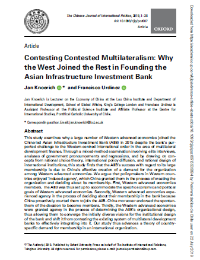Jan Knoerich and Francisco Urdinez
Jan Knoerich is Lecturer on the Economy of China at the Lau China Institute and Department of International Development, School of Global Affairs, King’s College London
Francisco Urdinez is Assistant Professor at the Political Science Institute and Affiliate Professor at the Centre for International Studies, Pontifical Catholic University of Chile.
Abstract
This study examines why a large number of Western advanced economies joined the China-led Asian Infrastructure Investment Bank (AIIB) in 2015 despite the bank’s purported challenge to the Western-centred international order in the area of multilateral development finance. Through a mixed-method examination involving elite interviews, analyses of government pronouncements and regressions, and by drawing on concepts from rational choice theory, international policy diffusion, and rational design of international institutions, this study finds that the AIIB’s success with regard to its large membership is due to China’s effective creation of a demand for the organization among Western advanced economies. We argue that policymakers in Western countries enjoyed ‘induced agency’, which China granted them in the process of creating the organization and deciding about its membership. First, Western advanced economies had agency because their involvement was needed to prevent the AIIB from becoming a homogenous small organization consisting of Asian debtor countries in favour of a global organization with a heterogeneous group of both debtor and creditor country members. The AIIB was thus set up to accommodate the specific economic and political goals of Western advanced economies. Secondly, Western advanced economies experienced agency in the process of deciding about their membership in the bank because China proactively courted them to join the AIIB. China moreover endorsed the spontaneous intensification of communications that ensued among Western advanced economies with regard to joining the AIIB. Both efforts ultimately resulted in diffusion among them of the decision to become members. Thirdly, the Western advanced economies were granted agency in the process of determining the AIIB’s organizational design, thus allowing them to converge the initially diverse visions for the institutional design of the bank and shift it from contesting the existing system of multilateral development banks to effectively integrating into it. Our study thus advances a theory of countryspecific demand for membership in an international organization.




